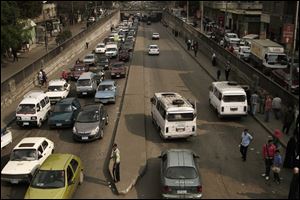
Cairo metro workers end strike after boss sacked
11/14/2012
People wait in their cars in traffic in Cairo, Egypt, Wednesday. Metro workers in the Egyptian capital called off a strike Wednesday after five hours that brought Cairo’s already notoriously snarled traffic to a standstill.
CAIRO — Metro workers in the Egyptian capital called off a strike Wednesday after five hours that brought Cairo's already notoriously snarled traffic to a standstill after the government caved in to their key demand and sacked the chairman of the subway system.
The workers went on strike to protest poor working conditions, inadequate equipment and poor management of the two-line subway that serves up to 4 million passengers in the city of 18 million people.
Traffic in Cairo nearly ground to a halt Wednesday after subway workers walked off the job. With metro services suspended, Cairo residents were forced to fall back on the weaker public bus network and the informal van services. In some metro stations, angry passengers tried to storm subway offices out of frustration with the stalled services.
The metro workers ended the strike after the Transportation Ministry said metro board chairman Ali Hussein was removed from his post. The state MENA news agency said he submitted his resignation.
Subway workers, who accuse Hussein of corruption, said mismanagement has led to poor conditions on the subway. They also demanded that their payment system be restructured and that they be granted time off and health care.
Nearly two years after a popular uprising that was fuelled in part by demands for social justice, Egypt is still struggling with labor unrest. Like employees in other sectors, the metro workers are also demanding better pay and a share in the company's profits. Hundreds of Egypt's public doctors have been on a partial strike for more than a month demanding improved facilities and better pay.
But the government is under pressure to begin economic reforms to bolster Egypt's ailing economy and a budget deficit that eats up to 11 percent of the GDP. Recently, the Finance Ministry said its salary bill has risen by nearly 19 percent compared to last year.
Expected austerity measures, such as scrapping fuel subsidies and reforming the tax system, are likely to be unpopular.
Prime Minister Hesham Kandil laid out some details of his plan Tuesday as his government negotiates a $4.8 billion loan with the International Monetary Fund.
During a meeting Wednesday with a high-level EU delegation led by EU foreign policy chief Catherine Ashton, Kandil said his government is looking for more cooperation with the 27-member bloc. Following an earlier meeting between Ashton and President Mohammed Morsi, presidential spokesman Yasser Ali said the EU has agreed to a 5 billion euro exceptional support package for Egypt over the next two years.